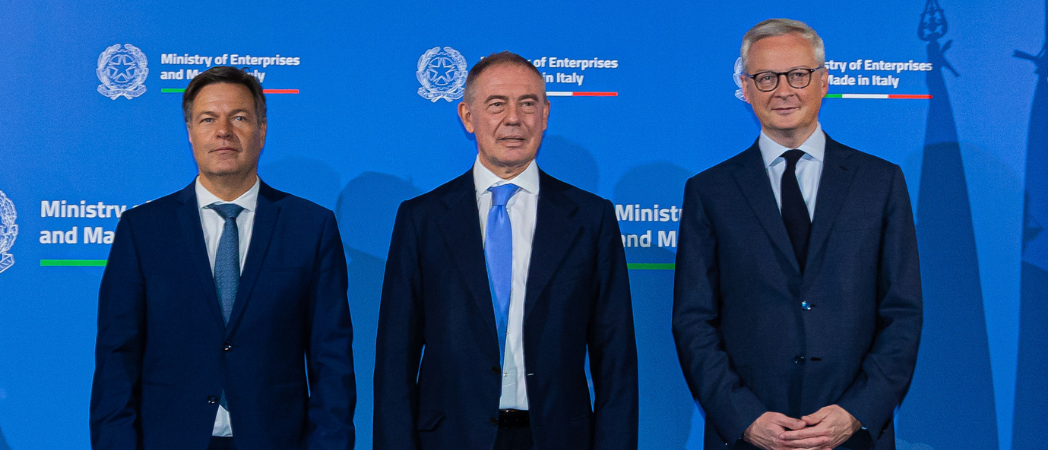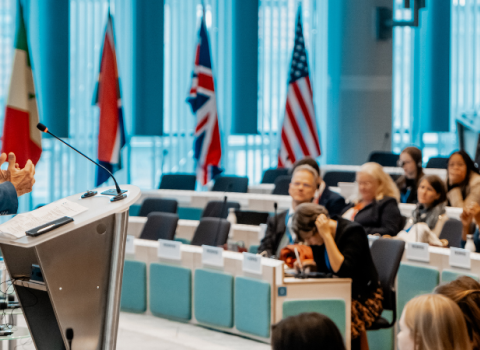It is time for Europe to “show its teeth”, said French finance minister Bruno Le Maire as he hosted his counterparts for a third tripartite meeting on European industrial policy on Monday

Bruno Le Maire (right), France’s Minister for Economy, Finance and Industrial and Digital Sovereignty, Robert Habeck, German Minister for Economic Affairs and Climate Action, and Adolfo Urso, Italian Minister of Enterprises at a previous tripartite meeting in Rome, October 2023. Photo credits: Ministry of Enterprises and Made in Italy
The EU needs a common strategy in response to Chinese interventionism and US protectionism, the economic and business ministers of France, Germany and Italy said after meeting to discuss European industrial policy in Meudon, near Paris, on Monday.
“What strikes me is that everybody in the world has an economic strategy, except for Europe,” French finance minister Bruno Le Maire told his counterparts as he opened the third such trilateral meeting since 2023.
“It’s our duty as the ministers of Europe’s three most powerful economies, representing more than 60% of European wealth, to define this economic strategy for the twenty-first century,” he said.
Le Maire was joined by Robert Habeck, German federal minister for economic affairs and Italian business minister Adolfo Urso, to discuss the development of green and digital technologies in advance of the European Council adopting its strategic agenda for 2024-2029 later this year. Industry representatives also participated in the debate.
“Does Europe simply want to be a creator of standards, or can we imagine a Europe where the continent would be an important geopolitical actor?” Habeck said after the meeting. “The three of us agree that the latter is the right answer.”
Even having the discussion is a sign of how the political climate has changed, said Le Maire. “The term ‘industrial policy’ is no longer taboo. A few years ago, when I was starting out as finance minister, you couldn’t pronounce the words ‘European economic policy’ or ‘European industrial policy’.”
Urso said the strategic partnership between the three countries is “pivotal” in driving innovation and economic security, and is based on “the consolidation of financial resources at the European level.”
Simplification
The ministers agreed that simplification for businesses should be at the heart of this strategy, which they hope will guide the new Commission following this year’s European elections.
They want the EU to extend the reporting exemptions given to SMEs, from companies with up to 250 employees, to those with up to 500 employees. They also want to strengthen the SME test the Commission uses to ensure new regulation does not increase the administrative burden on SMEs.
Le Maire called on the Commission to adopt an “omnibus directive”, a text which modifies several existing regulations at once, which would “remove pointless standards and lighten those which are too complicated.”
The Commission has set a target of reducing reporting requirements by 25%, but the ministers want it to go further.
In support of this, they recognised the Antwerp Declaration, a recent call by industry for a European industry deal, including an omnibus proposal.
There was also an acknowledgement that EU social and environmental regulations are impacting competitiveness in areas such as green energy and electric vehicles, by opening the door to cheap imports from countries with weaker standards.
“The problem with decarbonisation is it’s very expensive. All of our products are and will remain more expensive than those of our Chinese or American competitors,” Le Maire said. “Europe needs to show its teeth, and show that it’s determined to defend its industry.”
But there was disagreement over the best way to achieve this. Le Maire suggested introducing a “European preference” in public procurement, which would require 50% of the tender to be reserved for European production.
“If you deploy an offshore wind farm in the North Sea, the Mediterranean, or the Atlantic coast, 50% should come from European industry. It’s what the Chinese do, it’s what the Americans do,” he said.
That did not get the support of Habeck, who would prefer to see the inclusion of social and environmental criteria in a number of “priority areas”. He did however suggest there could be made in Europe requirements for critical infrastructure in fields such as security, defence and energy.
Italy on the other hand is “rather neutral” about the instruments used, as long as they contribute to making Europe a technological hub, said Urso. “We believe it is necessary to move from an economy based on consumers, to an economy based on producers,” he said, speaking on behalf of his French and German counterparts. “The focus on consumption has benefited products coming from other continents which don’t have the same rules in terms of social standards and workers’ rights.”
The three countries said the EU should provide increased support to strategic industries, to “help industrials, entrepreneurs, SMEs and researchers get access to the exceptional talents, research and innovation capacities, cutting-edge industrial equipment and state of the art processes they deserve.”
To encourage more private investment the EU should be more ambitious in the implementation of the Capital Markets Union, facilitate the approval of state aid, and accelerate the mobilisation of private finance for deep tech through the European Tech Champions initiative and the European Innovation Council.
The ministers also agreed that more investment is needed in security and defence, saying, “The EU needs to strengthen our capability to design and produce the EU defence goods we need.”
Habeck said, “Our exchange also underlined the need for greater European synergies in our defence industries, which is crucial in my view.”
While it received only a brief mention, AI is another technology Le Maire believes holds the key to boosting Europe’s competitiveness.
He invited his counterparts to consider launching a “European artificial intelligence community” modelled on the European Coal and Steel Community, “to pool our means in terms of artificial intelligence, and to allow us to gain in productivity.”
The first tripartite meeting in Berlin in June 2023 focused on securing Europe’s supply of critical raw materials, and the ministers met again in Rome last October to discuss AI. The next meeting will take place in Germany in October or November, and is likely to focus on aerospace and defence.





 A unique international forum for public research organisations and companies to connect their external engagement with strategic interests around their R&D system.
A unique international forum for public research organisations and companies to connect their external engagement with strategic interests around their R&D system.